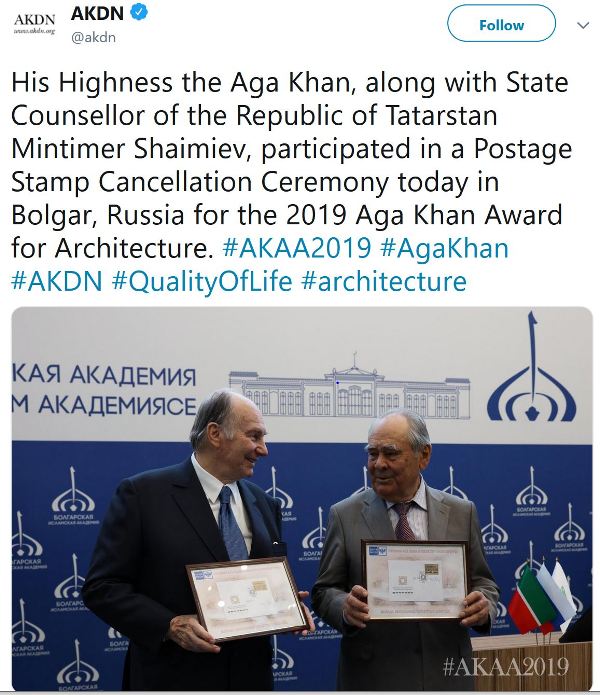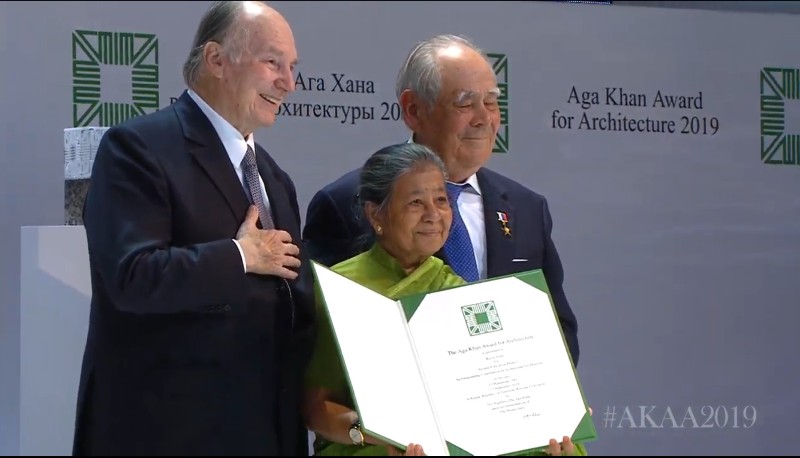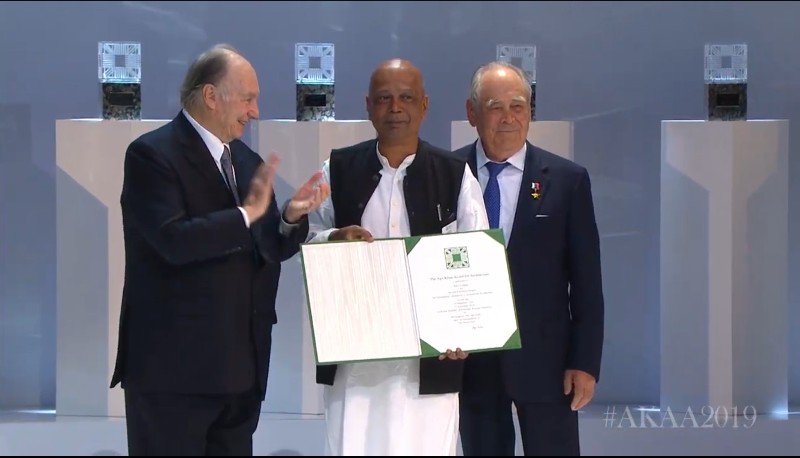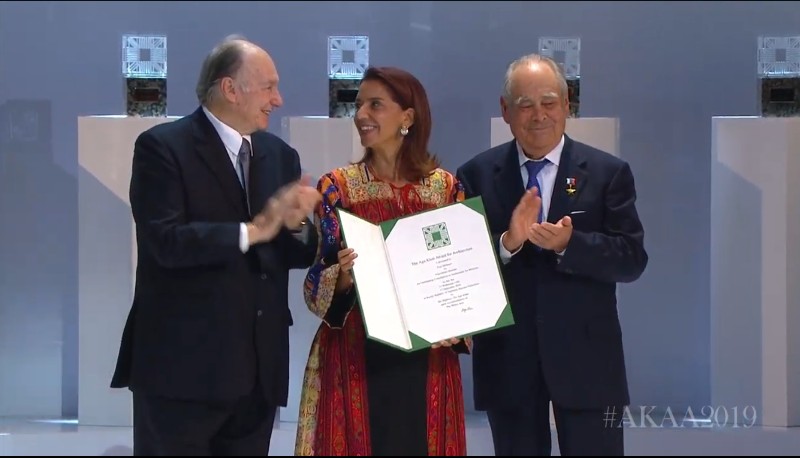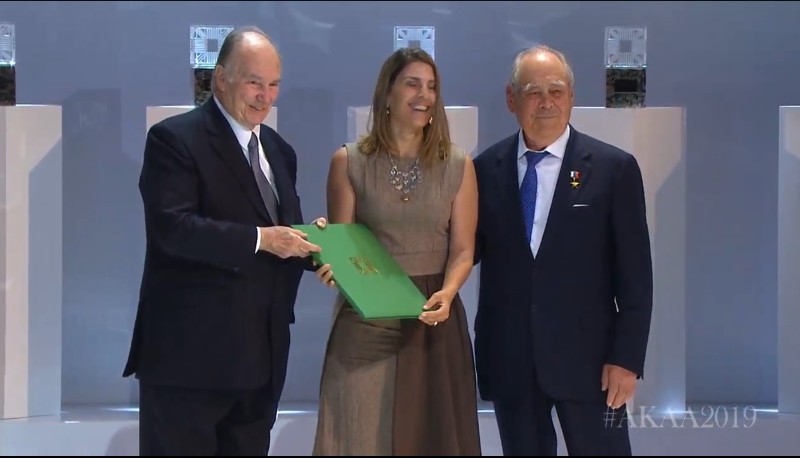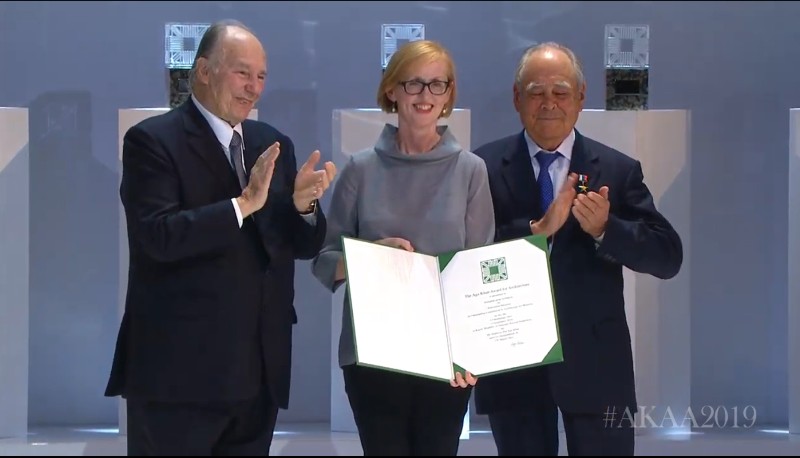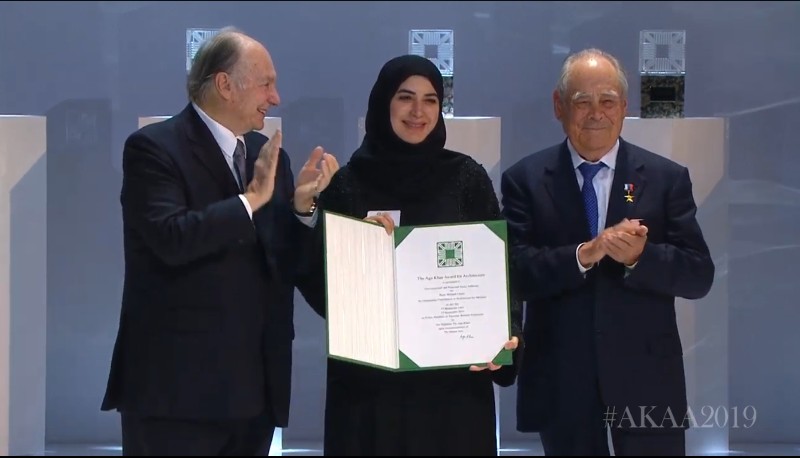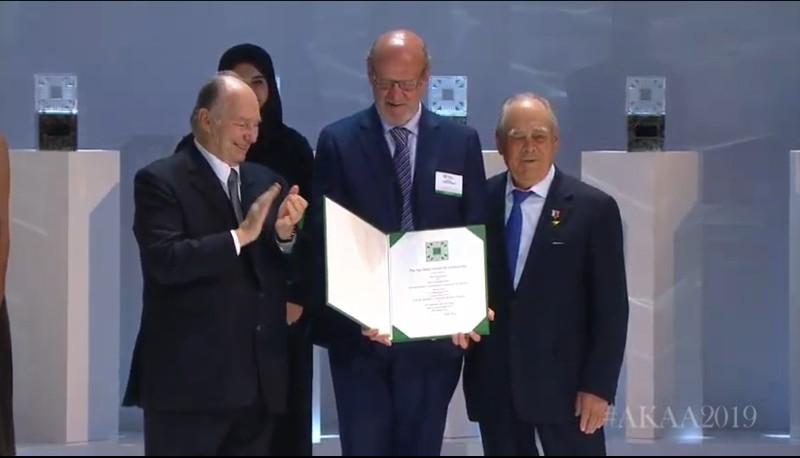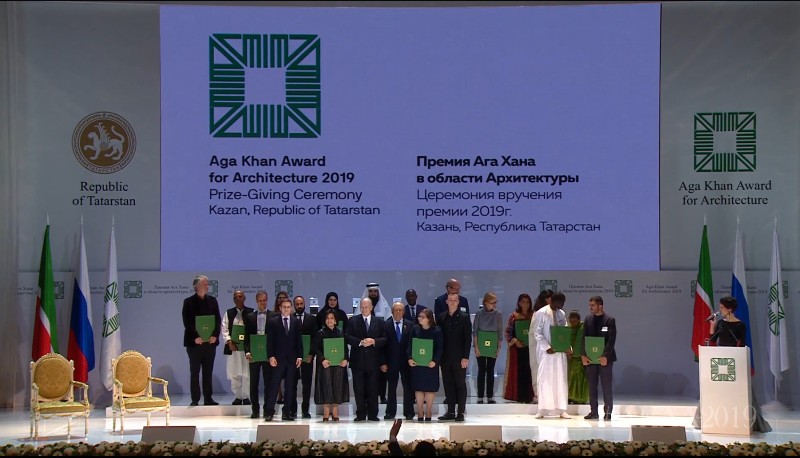Aga Khan Award for Architecture's 14th Cycle (2017 - 2019)
Aga Khan Award for Architecture's 14th Cycle (2017 - 2019)
Steering Committee selected for Aga Khan Award for Architecture
The Aga Khan Award for Architecture has announced the members of the Steering Committee for the Fourteenth Award Cycle (2017 – 2019). Established in 1977, the Award is given every three years to projects that set new standards of excellence in architecture, planning practices, historic preservation and landscape architecture.
The Steering Committee is chaired by His Highness the Aga Khan. The other members of the Steering Committee are: Sir David Adjaye, Principal Adjaye Associates, London, Mohammad al-Asad, Founding Director, Center for the Study of the Built Environment, Amman, Emre Arolat, Founder, EAA- Emre Arolat Architecture, New York-London-Istanbul, Francesco Bandarin, Special Advisor, UNESCO, Paris, Hanif Kara, Design Director – AKT II, London, and Professor at the Harvard University Graduate School of Design, Cambridge, Azim Nanji, Special Advisor, Aga Khan University, Nairobi, Nasser Rabbat, Aga Khan Professor, Massachusetts Institute of Technology, Cambridge, Brigitte Shim, Partner, Shim-Sutcliffe Architects, Toronto, and Marina Tabassum, Principal, Marina Tabassum Architects, Dhaka. Farrokh Derakhshani is the Director of the Award.
More...
https://www.canadianarchitect.com/award ... 003741886/
The Aga Khan Award for Architecture has announced the members of the Steering Committee for the Fourteenth Award Cycle (2017 – 2019). Established in 1977, the Award is given every three years to projects that set new standards of excellence in architecture, planning practices, historic preservation and landscape architecture.
The Steering Committee is chaired by His Highness the Aga Khan. The other members of the Steering Committee are: Sir David Adjaye, Principal Adjaye Associates, London, Mohammad al-Asad, Founding Director, Center for the Study of the Built Environment, Amman, Emre Arolat, Founder, EAA- Emre Arolat Architecture, New York-London-Istanbul, Francesco Bandarin, Special Advisor, UNESCO, Paris, Hanif Kara, Design Director – AKT II, London, and Professor at the Harvard University Graduate School of Design, Cambridge, Azim Nanji, Special Advisor, Aga Khan University, Nairobi, Nasser Rabbat, Aga Khan Professor, Massachusetts Institute of Technology, Cambridge, Brigitte Shim, Partner, Shim-Sutcliffe Architects, Toronto, and Marina Tabassum, Principal, Marina Tabassum Architects, Dhaka. Farrokh Derakhshani is the Director of the Award.
More...
https://www.canadianarchitect.com/award ... 003741886/
Aga Khan Award for Architecture announces 2019 Master Jury
Independent Master Jury Will Select Recipients of US$ 1 Million Prize
Geneva, Switzerland, 4 December 2018 – The members of the Master Jury for the 2017-2019 Cycle of the Aga Khan Award for Architecture were announced today. The Jury, which independently selects the recipients of the US$ 1 million Award, will convene in January 2019 to select a shortlist from hundreds of nominated projects.
The nine members of the Master Jury for the 2017-2019 Award cycle are:
Kwame Anthony Akroma-Ampim Kusi Appiah, an Anglo-Ghanaian American philosopher, is a cultural theorist, and novelist whose interests include political and moral theory, the philosophy of language and mind, literary studies, and African and African-American intellectual history. He is the author of three novels and more than a dozen works of philosophy, including Cosmopolitanism: Ethics in a World of Strangers, Experiments in Ethics and The Honor Code: How Moral Revolutions Happen. In 2012, President Obama presented him with a National Humanities Medal.
Meisa Batayneh, founder and principal architect of maisam architects & engineers, with offices in Amman and Abu Dhabi, is engaged actively in social initiatives that are catalysts for architecture and urban design. In 2015, she was recognised as the Leading Arab Woman Architect. Over her long and distinguished career, Ms. Batayneh has led multi-disciplinary teams on large-scale international and regional projects in USA, Pakistan, Cyprus, Saudi Arabia, Egypt, UAE and Jordan, and won many regional and international awards.
Sir David Chipperfield established David Chipperfield Architects in London in 1985, a practice that has built over 100 projects for both the private and public sectors, as well as civic projects and urban masterplans. Among the practice’s major completed works are the rebuilding of Neues Museum in Berlin; an MBA building for the HEC Paris School of Management; the Saint Louis Art Museum in Missouri, USA; the Museo Jumex in Mexico City; the Amorepacific Headquarters in Seoul; and a major redevelopment of the Royal Academy of Arts in London.
Elizabeth Diller is a founding partner of Diller Scofidio + Renfro (DS+R), a design studio whose practice spans the fields of architecture, urban design, installation art, multi-media performance, digital media, and print. Ms. Diller is also Professor of Architecture at Princeton University. Ms. Diller has been twice distinguished with Time magazine’s “100 Most Influential People”. She also received the first MacArthur Foundation fellowship awarded in the field of architecture. She is currently working in New York on The Shed and the expansion of MoMA (both opening in 2019).
Edhem Eldem is a Professor of History at Boğaziçi University (Istanbul) and holds the International Chair of Turkish and Ottoman History at the Collège de France. He has also taught at Berkeley, Harvard, Columbia, EHESS, EPHE, ENS, and was a fellow at the Wissenschaftskolleg, Berlin. He has worked and published on topics such as the Levant trade, funerary epigraphy, the Imperial Ottoman Bank, Orientalism and Westernization, Istanbul at the turn of the twentieth century, and the history of archaeology, museology, and photography in the Ottoman Empire.
Mona Fawaz is Professor in Urban Studies and Planning, the Coordinator of the Master in Urban Planning, Policy and Design, and the director of the Social Justice and the City research programme at the Issam Fares Institute of Public Policy at the American University of Beirut. Her scholarly interests include methods to make cities more inclusive. Her research spans across urban history and historiography, social and spatial justice, informality and the law, property and space, as well as planning practice, theory and pedagogy.
Kareem Ibrahim is an Egyptian architect and urban researcher who worked on UNDP’s Historic Cairo Rehabilitation Project and on the Darb al-Ahmar project, one of Cairo’s most ambitious urban revitalisation programmes. Between 2010 and 2017, he worked as Senior Development Manager for one of Cairo’s largest real estate development projects. Currently, he is the CEO of Takween Integrated Community Development and the Director of the “Rediscovering Esna’s Cultural Heritage Assets” project, which is aimedat the revitalisation of the city centre of one of Upper Egypt’s historic cities.
Ali M. Malkawi, a professor at Harvard University’s Graduate School of Design, is founding director of the Harvard Center for Green Buildings and Cities and Co-Area Head Master of Design for Energy and Environments. His projects and efforts are focused on building simulation, energy conservation and sustainability. He has consulted on large projects, including airports, “super” towers, industrial factories, and commercial and residential projects. Professor Malkawi is the recipient of several grants and awards, including the Jordan Star of Science from the King of Jordan.
Nondita Correa Mehrotra is an architect working in India and the United States. As principal of RMA Architects, she has been involved in the design of major international projects, such as the Lab of the Future at Novartis’ Basel campus. She has also worked with Charles Correa Associates on several projects, including the Brain and Cognitive Sciences building at MIT. As Director of the Charles Correa Foundation, she is involved in research, publications and projects focused on the improvement of the built habitat.
Once the Master Jury selects a shortlist, the shortlisted projects are then subjected to rigorous on- site reviews by independent experts, most of them architects, conservation specialists, planners or structural engineers. The Jury meets for a second time in summer 2019 to examine the on-site reviews and select the final recipients of the Award.
The selection process emphasises architecture that not only provides for people’s physical, social and economic needs, but that also stimulates and responds to their cultural aspirations. Particular attention is given to building schemes that use local resources and appropriate technology in innovative ways and to projects likely to inspire similar efforts elsewhere.
The Aga Khan Award for Architecture is governed by a Steering Committee chaired by
His Highness the Aga Khan. The other members of the Steering Committee are: Sir David Adjaye, Principal Adjaye Associates, London; Mohammad al-Asad, Founding Director, Center for the Study of the Built Environment, Amman; Emre Arolat, Founder, EAA- Emre Arolat Architecture, New York-London-Istanbul; Francesco Bandarin, Special Advisor, UNESCO, Paris; Hanif Kara, Design Director - AKT II, London, and Professor at the Harvard University Graduate School of Design, Cambridge; Azim Nanji, Special Advisor, Aga Khan University, Nairobi; Nasser Rabbat, Aga Khan Professor, Massachusetts Institute of Technology, Cambridge; Brigitte Shim, Partner, Shim- Sutcliffe Architects, Toronto; and Marina Tabassum, Principal, Marina Tabassum Architects, Dhaka.
Farrokh Derakhshani is the Director of the Award.
https://www.akdn.org/press-release/aga- ... aster-jury
Independent Master Jury Will Select Recipients of US$ 1 Million Prize
Geneva, Switzerland, 4 December 2018 – The members of the Master Jury for the 2017-2019 Cycle of the Aga Khan Award for Architecture were announced today. The Jury, which independently selects the recipients of the US$ 1 million Award, will convene in January 2019 to select a shortlist from hundreds of nominated projects.
The nine members of the Master Jury for the 2017-2019 Award cycle are:
Kwame Anthony Akroma-Ampim Kusi Appiah, an Anglo-Ghanaian American philosopher, is a cultural theorist, and novelist whose interests include political and moral theory, the philosophy of language and mind, literary studies, and African and African-American intellectual history. He is the author of three novels and more than a dozen works of philosophy, including Cosmopolitanism: Ethics in a World of Strangers, Experiments in Ethics and The Honor Code: How Moral Revolutions Happen. In 2012, President Obama presented him with a National Humanities Medal.
Meisa Batayneh, founder and principal architect of maisam architects & engineers, with offices in Amman and Abu Dhabi, is engaged actively in social initiatives that are catalysts for architecture and urban design. In 2015, she was recognised as the Leading Arab Woman Architect. Over her long and distinguished career, Ms. Batayneh has led multi-disciplinary teams on large-scale international and regional projects in USA, Pakistan, Cyprus, Saudi Arabia, Egypt, UAE and Jordan, and won many regional and international awards.
Sir David Chipperfield established David Chipperfield Architects in London in 1985, a practice that has built over 100 projects for both the private and public sectors, as well as civic projects and urban masterplans. Among the practice’s major completed works are the rebuilding of Neues Museum in Berlin; an MBA building for the HEC Paris School of Management; the Saint Louis Art Museum in Missouri, USA; the Museo Jumex in Mexico City; the Amorepacific Headquarters in Seoul; and a major redevelopment of the Royal Academy of Arts in London.
Elizabeth Diller is a founding partner of Diller Scofidio + Renfro (DS+R), a design studio whose practice spans the fields of architecture, urban design, installation art, multi-media performance, digital media, and print. Ms. Diller is also Professor of Architecture at Princeton University. Ms. Diller has been twice distinguished with Time magazine’s “100 Most Influential People”. She also received the first MacArthur Foundation fellowship awarded in the field of architecture. She is currently working in New York on The Shed and the expansion of MoMA (both opening in 2019).
Edhem Eldem is a Professor of History at Boğaziçi University (Istanbul) and holds the International Chair of Turkish and Ottoman History at the Collège de France. He has also taught at Berkeley, Harvard, Columbia, EHESS, EPHE, ENS, and was a fellow at the Wissenschaftskolleg, Berlin. He has worked and published on topics such as the Levant trade, funerary epigraphy, the Imperial Ottoman Bank, Orientalism and Westernization, Istanbul at the turn of the twentieth century, and the history of archaeology, museology, and photography in the Ottoman Empire.
Mona Fawaz is Professor in Urban Studies and Planning, the Coordinator of the Master in Urban Planning, Policy and Design, and the director of the Social Justice and the City research programme at the Issam Fares Institute of Public Policy at the American University of Beirut. Her scholarly interests include methods to make cities more inclusive. Her research spans across urban history and historiography, social and spatial justice, informality and the law, property and space, as well as planning practice, theory and pedagogy.
Kareem Ibrahim is an Egyptian architect and urban researcher who worked on UNDP’s Historic Cairo Rehabilitation Project and on the Darb al-Ahmar project, one of Cairo’s most ambitious urban revitalisation programmes. Between 2010 and 2017, he worked as Senior Development Manager for one of Cairo’s largest real estate development projects. Currently, he is the CEO of Takween Integrated Community Development and the Director of the “Rediscovering Esna’s Cultural Heritage Assets” project, which is aimedat the revitalisation of the city centre of one of Upper Egypt’s historic cities.
Ali M. Malkawi, a professor at Harvard University’s Graduate School of Design, is founding director of the Harvard Center for Green Buildings and Cities and Co-Area Head Master of Design for Energy and Environments. His projects and efforts are focused on building simulation, energy conservation and sustainability. He has consulted on large projects, including airports, “super” towers, industrial factories, and commercial and residential projects. Professor Malkawi is the recipient of several grants and awards, including the Jordan Star of Science from the King of Jordan.
Nondita Correa Mehrotra is an architect working in India and the United States. As principal of RMA Architects, she has been involved in the design of major international projects, such as the Lab of the Future at Novartis’ Basel campus. She has also worked with Charles Correa Associates on several projects, including the Brain and Cognitive Sciences building at MIT. As Director of the Charles Correa Foundation, she is involved in research, publications and projects focused on the improvement of the built habitat.
Once the Master Jury selects a shortlist, the shortlisted projects are then subjected to rigorous on- site reviews by independent experts, most of them architects, conservation specialists, planners or structural engineers. The Jury meets for a second time in summer 2019 to examine the on-site reviews and select the final recipients of the Award.
The selection process emphasises architecture that not only provides for people’s physical, social and economic needs, but that also stimulates and responds to their cultural aspirations. Particular attention is given to building schemes that use local resources and appropriate technology in innovative ways and to projects likely to inspire similar efforts elsewhere.
The Aga Khan Award for Architecture is governed by a Steering Committee chaired by
His Highness the Aga Khan. The other members of the Steering Committee are: Sir David Adjaye, Principal Adjaye Associates, London; Mohammad al-Asad, Founding Director, Center for the Study of the Built Environment, Amman; Emre Arolat, Founder, EAA- Emre Arolat Architecture, New York-London-Istanbul; Francesco Bandarin, Special Advisor, UNESCO, Paris; Hanif Kara, Design Director - AKT II, London, and Professor at the Harvard University Graduate School of Design, Cambridge; Azim Nanji, Special Advisor, Aga Khan University, Nairobi; Nasser Rabbat, Aga Khan Professor, Massachusetts Institute of Technology, Cambridge; Brigitte Shim, Partner, Shim- Sutcliffe Architects, Toronto; and Marina Tabassum, Principal, Marina Tabassum Architects, Dhaka.
Farrokh Derakhshani is the Director of the Award.
https://www.akdn.org/press-release/aga- ... aster-jury
https://worldarchitecture.org/article-l ... _2019.html
Aga Khan Award for Architecture announces Master Jury for 2019
Switzerland - Dec 6, 2018
The Aga Khan Award for Architecture has announced the Master Jury for the 2017-2019 Cycle. The jury independently will select the recipients of the US $1 million Award, and will convene in January 2019 to select a shortlist from hundreds of nominated projects.
The 9-member Master Jury panel is comprised of architects, urbanists, academics and theorists who contributed to the field of architecture. The Aga Khan Award for Architecture is part of the Geneva-based Aga Khan Trust for Culture (AKTC), which has a wide range of activities aimed at the preservation and promotion of the material and cultural heritage of Muslim societies.
Founded in 1977 by Aga Khan IV, the Aga Khan Award for Architecture is given every three years to projects that set new standards of excellence in architecture, planning practices, historic preservation and landscape architecture.
The Award seeks to identify and encourage building concepts that successfully address the needs and aspirations of societies across the world, in which Muslims have a significant presence.
The Master Jury panel is comprised of:
Kwame Anthony Akroma-Ampim Kusi Appiah, an Anglo-Ghanaian American philosopher and cultural theorist recognized for his work in 2012 by President Obama,
Meisa Batayneh, founder and principal architect of maisam architects & engineers in Amman and Abu Dhabi,
Sir David Chipperfield, founder and principal of David Chipperfield Architects in London and Berlin,
Elizabeth Diller, co-founder and principal of Diller Scofidio Renfro in New York,
Edhem Eldem, a Professor of History at Boğaziçi University (Istanbul) and International Chair of Turkish and Ottoman History at the Collège de France,
Mona Fawaz, Professor in Urban Studies and Planning, and the director of the Social Justice and the City research programme at the American University of Beirut,
Kareem Ibrahim, Egyptian architect and urban researcher who worked on UNDP’s Historic Cairo Rehabilitation Project,
Ali M. Malkawi, professor at Harvard University’s Graduate School of Design and founding director of the Harvard Center for Green Buildings and Cities,
Nondita Correa Mehrotra, principal of RMA Architects in India and the United States
Once the Master Jury selects a shortlist, the shortlisted projects are then subjected to rigorous on-site reviews by independent experts, most of them architects, conservation specialists, planners or structural engineers. The Jury meets for a second time in summer 2019 to examine the on-site reviews and select the final recipients of the Award.
The selection process emphasises architecture that not only provides for people’s physical, social and economic needs, but that also stimulates and responds to their cultural aspirations. Particular attention is given to building schemes that use local resources and appropriate technology in innovative ways and to projects likely to inspire similar efforts elsewhere.
Bait Ur Rouf Mosque, Dhaka, Bangladesh by Marina Tabassum. The project is winner of the Awards in the 2014-2016 Cycle. Image © Rajesh Vora
The Aga Khan Award for Architecture is governed by a Steering Committee chaired by His Highness the Aga Khan. The other members of the Steering Committee are: Sir David Adjaye, Principal Adjaye Associates, London; Mohammad al-Asad, Founding Director, Center for the Study of the Built Environment, Amman; Emre Arolat, Founder, EAA- Emre Arolat Architecture, New York-London-Istanbul; Francesco Bandarin, Special Advisor, UNESCO, Paris; Hanif Kara, Design Director - AKT II, London, and Professor at the Harvard University Graduate School of Design, Cambridge; Azim Nanji, Special Advisor, Aga Khan University, Nairobi; Nasser Rabbat, Aga Khan Professor, Massachusetts Institute of Technology, Cambridge; Brigitte Shim, Partner, Shim- Sutcliffe Architects, Toronto; and Marina Tabassum, Principal, Marina Tabassum Architects, Dhaka.
Farrokh Derakhshani is the Director of the Award.
Top image (from left to right): Kwame Anthony Akroma-Ampim Kusi Appiah, Meisa Batayneh, Sir David Chipperfield, Elizabeth Diller, Edhem Eldem, Mona Fawaz, Kareem Ibrahim, Ali M. Malkawi, Nondita Correa Mehrotra. Images courtesy of AKDN.
Aga Khan Award for Architecture announces Master Jury for 2019
Switzerland - Dec 6, 2018
The Aga Khan Award for Architecture has announced the Master Jury for the 2017-2019 Cycle. The jury independently will select the recipients of the US $1 million Award, and will convene in January 2019 to select a shortlist from hundreds of nominated projects.
The 9-member Master Jury panel is comprised of architects, urbanists, academics and theorists who contributed to the field of architecture. The Aga Khan Award for Architecture is part of the Geneva-based Aga Khan Trust for Culture (AKTC), which has a wide range of activities aimed at the preservation and promotion of the material and cultural heritage of Muslim societies.
Founded in 1977 by Aga Khan IV, the Aga Khan Award for Architecture is given every three years to projects that set new standards of excellence in architecture, planning practices, historic preservation and landscape architecture.
The Award seeks to identify and encourage building concepts that successfully address the needs and aspirations of societies across the world, in which Muslims have a significant presence.
The Master Jury panel is comprised of:
Kwame Anthony Akroma-Ampim Kusi Appiah, an Anglo-Ghanaian American philosopher and cultural theorist recognized for his work in 2012 by President Obama,
Meisa Batayneh, founder and principal architect of maisam architects & engineers in Amman and Abu Dhabi,
Sir David Chipperfield, founder and principal of David Chipperfield Architects in London and Berlin,
Elizabeth Diller, co-founder and principal of Diller Scofidio Renfro in New York,
Edhem Eldem, a Professor of History at Boğaziçi University (Istanbul) and International Chair of Turkish and Ottoman History at the Collège de France,
Mona Fawaz, Professor in Urban Studies and Planning, and the director of the Social Justice and the City research programme at the American University of Beirut,
Kareem Ibrahim, Egyptian architect and urban researcher who worked on UNDP’s Historic Cairo Rehabilitation Project,
Ali M. Malkawi, professor at Harvard University’s Graduate School of Design and founding director of the Harvard Center for Green Buildings and Cities,
Nondita Correa Mehrotra, principal of RMA Architects in India and the United States
Once the Master Jury selects a shortlist, the shortlisted projects are then subjected to rigorous on-site reviews by independent experts, most of them architects, conservation specialists, planners or structural engineers. The Jury meets for a second time in summer 2019 to examine the on-site reviews and select the final recipients of the Award.
The selection process emphasises architecture that not only provides for people’s physical, social and economic needs, but that also stimulates and responds to their cultural aspirations. Particular attention is given to building schemes that use local resources and appropriate technology in innovative ways and to projects likely to inspire similar efforts elsewhere.
Bait Ur Rouf Mosque, Dhaka, Bangladesh by Marina Tabassum. The project is winner of the Awards in the 2014-2016 Cycle. Image © Rajesh Vora
The Aga Khan Award for Architecture is governed by a Steering Committee chaired by His Highness the Aga Khan. The other members of the Steering Committee are: Sir David Adjaye, Principal Adjaye Associates, London; Mohammad al-Asad, Founding Director, Center for the Study of the Built Environment, Amman; Emre Arolat, Founder, EAA- Emre Arolat Architecture, New York-London-Istanbul; Francesco Bandarin, Special Advisor, UNESCO, Paris; Hanif Kara, Design Director - AKT II, London, and Professor at the Harvard University Graduate School of Design, Cambridge; Azim Nanji, Special Advisor, Aga Khan University, Nairobi; Nasser Rabbat, Aga Khan Professor, Massachusetts Institute of Technology, Cambridge; Brigitte Shim, Partner, Shim- Sutcliffe Architects, Toronto; and Marina Tabassum, Principal, Marina Tabassum Architects, Dhaka.
Farrokh Derakhshani is the Director of the Award.
Top image (from left to right): Kwame Anthony Akroma-Ampim Kusi Appiah, Meisa Batayneh, Sir David Chipperfield, Elizabeth Diller, Edhem Eldem, Mona Fawaz, Kareem Ibrahim, Ali M. Malkawi, Nondita Correa Mehrotra. Images courtesy of AKDN.
2019 Shortlist Announced for Aga Khan Award for Architecture
Master Jury to decide share of US$ 1 million prize
Geneva, Switzerland, 25 April 2019 – The 20 shortlisted projects for the 2019 Aga Khan Award for Architecture were announced today. The projects will compete for US$ 1 million in prize money.
In January, an independent Master Jury reviewed hundreds of nominations. The 20 shortlisted projects are now undergoing rigorous investigations by a team of experts who visit and evaluate each project on-site. Their reports are the basis for the Master Jury’s selection of the eventual laureates. It should be noted that projects commissioned by the Aga Khan or any of the institutions of the Aga Khan Development Network (AKDN) are ineligible for the Award. To be eligible for consideration in the 2019 Award cycle, projects had to be completed between 1 January 2012 and 31 December 2017, and should have been in use for at least one year.
A full on-line press kit, including briefs on each project and high-resolution images, is available here.
The 20 shortlisted projects are:
Images and more...
https://www.akdn.org/press-release/2019 ... chitecture
Master Jury to decide share of US$ 1 million prize
Geneva, Switzerland, 25 April 2019 – The 20 shortlisted projects for the 2019 Aga Khan Award for Architecture were announced today. The projects will compete for US$ 1 million in prize money.
In January, an independent Master Jury reviewed hundreds of nominations. The 20 shortlisted projects are now undergoing rigorous investigations by a team of experts who visit and evaluate each project on-site. Their reports are the basis for the Master Jury’s selection of the eventual laureates. It should be noted that projects commissioned by the Aga Khan or any of the institutions of the Aga Khan Development Network (AKDN) are ineligible for the Award. To be eligible for consideration in the 2019 Award cycle, projects had to be completed between 1 January 2012 and 31 December 2017, and should have been in use for at least one year.
A full on-line press kit, including briefs on each project and high-resolution images, is available here.
The 20 shortlisted projects are:
Images and more...
https://www.akdn.org/press-release/2019 ... chitecture
Aga Khan Award for Architecture 2019 Shortist Introduction
Video:
https://www.youtube.com/watch?v=gZ3lQeD9t1I
Learn more about the Aga Khan Award for Architecture and the 20 projects shortlisted in the 2019 cycle.
Video:
https://www.youtube.com/watch?v=gZ3lQeD9t1I
Learn more about the Aga Khan Award for Architecture and the 20 projects shortlisted in the 2019 cycle.
Kazan Public Space
Video:
https://www.youtube.com/watch?v=7GQP9KFUneQ
https://www.akdn.org/architecture/proje ... -programme
*****
Concrete at Al-Serkal Avenue
Video:
https://www.youtube.com/watch?v=NkdTl_ZDN34
https://www.akdn.org/architecture/proje ... kal-avenue
Video:
https://www.youtube.com/watch?v=7GQP9KFUneQ
https://www.akdn.org/architecture/proje ... -programme
*****
Concrete at Al-Serkal Avenue
Video:
https://www.youtube.com/watch?v=NkdTl_ZDN34
https://www.akdn.org/architecture/proje ... kal-avenue
Al Mureijah Art Spaces
Video:
https://www.youtube.com/watch?v=EuEhs782GYc
The adaptive reuse of structures has preserved the traditional urban tissue, revitalising an older neighbourhood while providing flexible spaces for the Sharjah Biennale. More information available:
https://www.akdn.org/architecture/proje ... art-spaces
Video:
https://www.youtube.com/watch?v=EuEhs782GYc
The adaptive reuse of structures has preserved the traditional urban tissue, revitalising an older neighbourhood while providing flexible spaces for the Sharjah Biennale. More information available:
https://www.akdn.org/architecture/proje ... art-spaces
Wasit Wetland Centre
Video:
https://www.youtube.com/watch?v=j82tG1sOSxI
Part of a much larger project to clean up and rehabilitate this ancient chain of wetlands along the coast, the Wetland Centre aims to provide information and education about this unique environment – and to encourage its preservation. For more information:
https://www.akdn.org/architecture/proje ... and-centre
Video:
https://www.youtube.com/watch?v=j82tG1sOSxI
Part of a much larger project to clean up and rehabilitate this ancient chain of wetlands along the coast, the Wetland Centre aims to provide information and education about this unique environment – and to encourage its preservation. For more information:
https://www.akdn.org/architecture/proje ... and-centre
Muttrah Fish Market
Video:
https://www.youtube.com/watch?v=Gwhd7UCTSqY
The new market celebrates the continuity of the region’s trade and fishing traditions, while also catering to Oman’s growing tourism industry. Find out more here:
https://www.akdn.org/architecture/proje ... ish-market
******
Revitalisation of Muharraq
Video:
https://www.youtube.com/watch?v=OGEqxp-imBk
This site, inscribed on the UNESCO World Heritage List, is an exceptional testimony to the pearl trade in the Arabian Peninsula, on which Bahrain thrived during the 19th century. Find out more:
https://www.akdn.org/architecture/proje ... n-muharraq
Video:
https://www.youtube.com/watch?v=Gwhd7UCTSqY
The new market celebrates the continuity of the region’s trade and fishing traditions, while also catering to Oman’s growing tourism industry. Find out more here:
https://www.akdn.org/architecture/proje ... ish-market
******
Revitalisation of Muharraq
Video:
https://www.youtube.com/watch?v=OGEqxp-imBk
This site, inscribed on the UNESCO World Heritage List, is an exceptional testimony to the pearl trade in the Arabian Peninsula, on which Bahrain thrived during the 19th century. Find out more:
https://www.akdn.org/architecture/proje ... n-muharraq
Ashinaga Uganda Dormitory
Video:
https://www.youtube.com/watch?v=68tpmb- ... rce=Direct
This residential school accommodates 50 orphans from different countries in sub-Saharan Africa. The students learn to live together with people from different cultures and are prepared to enter universities abroad. Find our more here: https://www.akdn.org/architecture/proje ... -dormitory
*****
Msheireb Museums
Video:
https://www.youtube.com/watch?v=WoPB2vXEXEI
Four historic courtyard houses dating from the early 20th century have been remodelled and extended to accommodate unified, state-of-the-art museums that together comprise a central element of the development of downtown Doha. For more information, see: https://www.akdn.org/architecture/proje ... eb-museums
Video:
https://www.youtube.com/watch?v=68tpmb- ... rce=Direct
This residential school accommodates 50 orphans from different countries in sub-Saharan Africa. The students learn to live together with people from different cultures and are prepared to enter universities abroad. Find our more here: https://www.akdn.org/architecture/proje ... -dormitory
*****
Msheireb Museums
Video:
https://www.youtube.com/watch?v=WoPB2vXEXEI
Four historic courtyard houses dating from the early 20th century have been remodelled and extended to accommodate unified, state-of-the-art museums that together comprise a central element of the development of downtown Doha. For more information, see: https://www.akdn.org/architecture/proje ... eb-museums
Tadjourah SOS Children's Village
Video:
https://www.youtube.com/watch?v=CsIwwEoFEXQ
Based on the model of SOS Children’s Villages, the project team built 15 houses in a medina-styled complex designed to shelter at-risk children and give them the chance of a normal childhood in a loving family. Read more here: https://www.akdn.org/architecture/proje ... ns-village
Video:
https://www.youtube.com/watch?v=CsIwwEoFEXQ
Based on the model of SOS Children’s Villages, the project team built 15 houses in a medina-styled complex designed to shelter at-risk children and give them the chance of a normal childhood in a loving family. Read more here: https://www.akdn.org/architecture/proje ... ns-village
Arcadia Education Project
Video:
https://www.youtube.com/watch?v=S8g_eyzYQ5M
Maleka Welfare Trust, a private social welfare organization, purchased a patch of land to relocate one of their preschools and develop additional social facilities, such as a hostel for single women, a nursery and a vocational training centre. Read more here:
https://www.akdn.org/architecture/proje ... on-project
Video:
https://www.youtube.com/watch?v=S8g_eyzYQ5M
Maleka Welfare Trust, a private social welfare organization, purchased a patch of land to relocate one of their preschools and develop additional social facilities, such as a hostel for single women, a nursery and a vocational training centre. Read more here:
https://www.akdn.org/architecture/proje ... on-project
Amber Denim Loom Shed
Video:
https://www.youtube.com/watch?v=IvAMKqUR2_8
The “Loom Shed” is a new design that employs a traditional Bangladeshi residential architecture with contemporary elements that give it a modern twist. Find out more here: https://www.akdn.org/architecture/proje ... -loom-shed
Video:
https://www.youtube.com/watch?v=IvAMKqUR2_8
The “Loom Shed” is a new design that employs a traditional Bangladeshi residential architecture with contemporary elements that give it a modern twist. Find out more here: https://www.akdn.org/architecture/proje ... -loom-shed
Beyazit Library State Renovation
Video:
https://www.youtube.com/watch?v=K1GrWJmpeeU
******
Jarahieh School
Video:
https://www.youtube.com/watch?v=Fk6W9XQFm3g
*****
Warka Water Project
https://www.youtube.com/watch?v=1fNRimw3c4M
*****
Lecture Building at the Alioune Diop University
Video:
https://www.youtube.com/watch?v=2JUp7L9r1Sw
****
Palestinian Museum
Video:
https://www.youtube.com/watch?v=J_vfrgeTZTU
****
AM Residence
Video:
https://www.youtube.com/watch?v=pw8rA4cvkdE
*****
Taman Bima Microlibrary
Video:
https://www.youtube.com/watch?v=sQY3KUdPkQY
****
Courtyard House Plugin
Video:
https://www.youtube.com/watch?v=Yc0vGi9ya5k
Video:
https://www.youtube.com/watch?v=K1GrWJmpeeU
******
Jarahieh School
Video:
https://www.youtube.com/watch?v=Fk6W9XQFm3g
*****
Warka Water Project
https://www.youtube.com/watch?v=1fNRimw3c4M
*****
Lecture Building at the Alioune Diop University
Video:
https://www.youtube.com/watch?v=2JUp7L9r1Sw
****
Palestinian Museum
Video:
https://www.youtube.com/watch?v=J_vfrgeTZTU
****
AM Residence
Video:
https://www.youtube.com/watch?v=pw8rA4cvkdE
*****
Taman Bima Microlibrary
Video:
https://www.youtube.com/watch?v=sQY3KUdPkQY
****
Courtyard House Plugin
Video:
https://www.youtube.com/watch?v=Yc0vGi9ya5k
Winners of the 2019 Aga Khan Award for Architecture announced
Earlier today, six winners of the 2019 Aga Khan Award for Architecture cycle were announced, recognising a wide variety of projects in Bahrain, Bangladesh, Palestine, the Russian Federation, Senegal, and the United Arab Emirates.
The Aga Khan Award for Architecture was established by Mawlana Hazar Imam in 1977, with the purpose of renewing the rich traditions of Islamic architecture. In recent history, these traditions have often suffered along with modernisation and westernisation of building practices, leading to a loss of cultural legacy. In response, the Award seeks to identify and encourage building concepts that successfully address the needs and aspirations of communities in which Muslims have a significant presence.
Over the past 42 years, the award has recognised examples of architectural excellence in the fields of contemporary design, social housing, community improvement and development, historic preservation, reuse and area conservation, as well as landscape design and improvement of the environment. The award rewards not only architects, but also municipalities, builders, clients, artisans, and engineers who have contributed to winning projects.
Since its launch, 13 triennial award cycles have been completed, and 116 projects across the world have been recognised — from France to China — while winners have hailed from New York to Dhaka. This year’s winners will share US $1 million between them.
Aga Khan Award for Architecture ceremonies have traditionally been held in settings selected for their architectural and cultural importance to the Muslim world. This year’s ceremony will take place held in Kazan, Russia, which contains a World Heritage Site. Previous Award ceremonies have been hosted at some of the most illustrious architectural settings in the Muslim world, including Shalimar Gardens in Lahore, Pakistan; Topkapi Palace in Instanbul, Turkey; the Alhambra in Granada, Spain; and Humayun’s Tomb in Delhi, India.
The 2016 cycle was held in the United Arab Emirates, at which Mawlana Hazar Imam explained the importance of the Award, saying, “Architecture is the only art form which has a direct, daily impact on the quality of human life.” He went on to say that, “The Award seeks to guide and inspire better building in the future” and that “we hope to remind people everywhere, of all backgrounds and identities, of a powerful lesson: The way in which a thoughtful concern for the built environment can characterise an entire civilisation.”
Taking place from 12-14 September in Kazan, Russia, the 2019 Award proceedings will include a seminar and the Award Ceremony which will be presided over by Mawlana Hazar Imam. The ceremony, on Friday 13 September will be webcast live - more details will be released closer to the date.
The 2019 winning projects are:
Revitalisation of Muharraq (Bahrain)
Arcadia Education Project, in South Kanarchor (Bangladesh)
Palestinian Museum, in Birzeit (Palestine)
Public Spaces Development Programme, in the Republic of Tatarstan (Russian Federation)
Alioune Diop University Teaching and Research Unit, in Bambey (Senegal)
Wasit Wetland Centre, in Sharjah (UAE)
For more information on each of the winning projects, including full briefs, images, video, and more, please see: https://www.akdn.org/aga-khan-award-arc ... 19-winners
https://the.ismaili/news/winners-2019-a ... -announced
Photographs of the winners at:
https://www.akdn.org/aga-khan-award-arc ... rce=Direct
Earlier today, six winners of the 2019 Aga Khan Award for Architecture cycle were announced, recognising a wide variety of projects in Bahrain, Bangladesh, Palestine, the Russian Federation, Senegal, and the United Arab Emirates.
The Aga Khan Award for Architecture was established by Mawlana Hazar Imam in 1977, with the purpose of renewing the rich traditions of Islamic architecture. In recent history, these traditions have often suffered along with modernisation and westernisation of building practices, leading to a loss of cultural legacy. In response, the Award seeks to identify and encourage building concepts that successfully address the needs and aspirations of communities in which Muslims have a significant presence.
Over the past 42 years, the award has recognised examples of architectural excellence in the fields of contemporary design, social housing, community improvement and development, historic preservation, reuse and area conservation, as well as landscape design and improvement of the environment. The award rewards not only architects, but also municipalities, builders, clients, artisans, and engineers who have contributed to winning projects.
Since its launch, 13 triennial award cycles have been completed, and 116 projects across the world have been recognised — from France to China — while winners have hailed from New York to Dhaka. This year’s winners will share US $1 million between them.
Aga Khan Award for Architecture ceremonies have traditionally been held in settings selected for their architectural and cultural importance to the Muslim world. This year’s ceremony will take place held in Kazan, Russia, which contains a World Heritage Site. Previous Award ceremonies have been hosted at some of the most illustrious architectural settings in the Muslim world, including Shalimar Gardens in Lahore, Pakistan; Topkapi Palace in Instanbul, Turkey; the Alhambra in Granada, Spain; and Humayun’s Tomb in Delhi, India.
The 2016 cycle was held in the United Arab Emirates, at which Mawlana Hazar Imam explained the importance of the Award, saying, “Architecture is the only art form which has a direct, daily impact on the quality of human life.” He went on to say that, “The Award seeks to guide and inspire better building in the future” and that “we hope to remind people everywhere, of all backgrounds and identities, of a powerful lesson: The way in which a thoughtful concern for the built environment can characterise an entire civilisation.”
Taking place from 12-14 September in Kazan, Russia, the 2019 Award proceedings will include a seminar and the Award Ceremony which will be presided over by Mawlana Hazar Imam. The ceremony, on Friday 13 September will be webcast live - more details will be released closer to the date.
The 2019 winning projects are:
Revitalisation of Muharraq (Bahrain)
Arcadia Education Project, in South Kanarchor (Bangladesh)
Palestinian Museum, in Birzeit (Palestine)
Public Spaces Development Programme, in the Republic of Tatarstan (Russian Federation)
Alioune Diop University Teaching and Research Unit, in Bambey (Senegal)
Wasit Wetland Centre, in Sharjah (UAE)
For more information on each of the winning projects, including full briefs, images, video, and more, please see: https://www.akdn.org/aga-khan-award-arc ... 19-winners
https://the.ismaili/news/winners-2019-a ... -announced
Photographs of the winners at:
https://www.akdn.org/aga-khan-award-arc ... rce=Direct
https://www.archdaily.com/923923/the-20 ... chitecture
The 2019 Winners of the Aga Khan Award for Architecture
07:41 - 29 August, 2019 by Christele Harrouk
The 6 winners of the 2019 Aga Khan Award for Architecture were announced today, by Irada Ayupova, Minister of Culture of the Republic of Tatarstan and Farrokh Derakhshani, Director of the Aga Khan Award for Architecture, at a press conference in Kazan, Republic of Tartarstan.
The Aga Khan Award for Architecture, established in 1977, by His Highness the Aga Khan aims to identify and encourage projects that successfully addressed the needs and aspirations of communities where a significant presence of Islamic societies exist. In fact, the awards celebrate the projects that respond particularly to their context and the cultural needs of the inhabitants. The winners of the yearly honour will share US$ 1 million between them, which recognizes all parties involved in the conception, design, and realization of a built project. Moreover, “the Award not only rewards architects but also identifies municipalities, builders, clients, master artisans and engineers who have played important roles in the realization of a project.”
The winners of the 2019 Aga Khan Award for Architecture are:
Bahrain: Revitalization of Muharraq
RRAQ (BAHRAIN). Image © Aga Khan Trust for Culture / Cemal Emden
REVITALISATION OF MUHARRAQ (BAHRAIN). Image © Aga Khan Trust for Culture / Cemal Emden
“The Project, which highlights the World Heritage site’s pearling history, was first initiated as a series of restoration and reuse projects. The project evolved into a comprehensive programme that aimed to rebalance the city’s demographic makeup by creating public spaces, providing community and cultural venues, and improving the overall environment.”
Bangladesh: Arcadia Education Project, in South Kanarchor
ARCADIA EDUCATION PROJECT (BANGLADESH). Image © Aga Khan Trust for Culture / Sanndro di Carlo Darsa
“The Project in South Kanarchor is a modular structure that takes a novel approach to a riverine site that is often flooded for five months every year. Rather than disrupting the ecosystem to create a mound for building, the architect devised the solution of an amphibious structure that could sit on the ground or float on the water, depending on seasonal conditions.”
Palestine: Palestinian Museum, in Birzeit
PALESTINIAN MUSEUM (PALESTINE). Image © Aga Khan Trust for Culture / Cemal Emden
“The Project in Birzeit, which crowns a terraced hill overlooking the Mediterranean, is the recipient of the LEED Gold certification because of its sustainable construction. The zigzagging forms of the Museum’s architecture and hillside gardens are inspired by the surrounding agricultural terraces, stressing the link with the land and Palestinian heritage.”
Russian Federation: Public Spaces Development Programme, in Kazan, the Republic of Tatarstan
PUBLIC SPACES DEVELOPMENT PROGRAMME (RUSSIAN FEDERATION). Image © Ivan Petrov
“A programme in the Republic of Tatarstan that, to date, has improved 328 public spaces all over Tatarstan. The ambitious programme sought to counter the trend toward private ownership by refocusing priorities on quality public spaces for the people of Tatarstan. It has now become a model throughout the Russian Federation.”
Senegal: Alioune Diop University Teaching and Research Unit, in Bambey
ALIOUNE DIOP UNIVERSITY TEACHING AND RESEARCH UNIT (SENEGAL). Image © Aga Khan Trust for Culture / Chérif Tall
“The Project in Bambey, where a scarcity of resources led to the use of bioclimatic strategies, includes a large double roof canopy and latticework that avoids solar radiation but allows air to flow through it. By employing familiar construction techniques and following sustainability principles, it succeeded in keeping costs and maintenance demands to a minimum, while still making a bold architectural statement.”
United Arab Emirates: Wasit Wetland Centre, in Sharjah
WASIT WETLAND CENTRE (UAE). Image © X-Architects / Nelson Garrido
“Wasit Wetland Centre, in Sharjah, is a design that transformed a wasteland into a wetland and functioned as a catalyst for biodiversity and environmental education. While its indigenous ecosystem has been restored, it has also proven to be a popular place for visitors to appreciate and learn about their natural environment.”
The 2019 Winners of the Aga Khan Award for Architecture
07:41 - 29 August, 2019 by Christele Harrouk
The 6 winners of the 2019 Aga Khan Award for Architecture were announced today, by Irada Ayupova, Minister of Culture of the Republic of Tatarstan and Farrokh Derakhshani, Director of the Aga Khan Award for Architecture, at a press conference in Kazan, Republic of Tartarstan.
The Aga Khan Award for Architecture, established in 1977, by His Highness the Aga Khan aims to identify and encourage projects that successfully addressed the needs and aspirations of communities where a significant presence of Islamic societies exist. In fact, the awards celebrate the projects that respond particularly to their context and the cultural needs of the inhabitants. The winners of the yearly honour will share US$ 1 million between them, which recognizes all parties involved in the conception, design, and realization of a built project. Moreover, “the Award not only rewards architects but also identifies municipalities, builders, clients, master artisans and engineers who have played important roles in the realization of a project.”
The winners of the 2019 Aga Khan Award for Architecture are:
Bahrain: Revitalization of Muharraq
RRAQ (BAHRAIN). Image © Aga Khan Trust for Culture / Cemal Emden
REVITALISATION OF MUHARRAQ (BAHRAIN). Image © Aga Khan Trust for Culture / Cemal Emden
“The Project, which highlights the World Heritage site’s pearling history, was first initiated as a series of restoration and reuse projects. The project evolved into a comprehensive programme that aimed to rebalance the city’s demographic makeup by creating public spaces, providing community and cultural venues, and improving the overall environment.”
Bangladesh: Arcadia Education Project, in South Kanarchor
ARCADIA EDUCATION PROJECT (BANGLADESH). Image © Aga Khan Trust for Culture / Sanndro di Carlo Darsa
“The Project in South Kanarchor is a modular structure that takes a novel approach to a riverine site that is often flooded for five months every year. Rather than disrupting the ecosystem to create a mound for building, the architect devised the solution of an amphibious structure that could sit on the ground or float on the water, depending on seasonal conditions.”
Palestine: Palestinian Museum, in Birzeit
PALESTINIAN MUSEUM (PALESTINE). Image © Aga Khan Trust for Culture / Cemal Emden
“The Project in Birzeit, which crowns a terraced hill overlooking the Mediterranean, is the recipient of the LEED Gold certification because of its sustainable construction. The zigzagging forms of the Museum’s architecture and hillside gardens are inspired by the surrounding agricultural terraces, stressing the link with the land and Palestinian heritage.”
Russian Federation: Public Spaces Development Programme, in Kazan, the Republic of Tatarstan
PUBLIC SPACES DEVELOPMENT PROGRAMME (RUSSIAN FEDERATION). Image © Ivan Petrov
“A programme in the Republic of Tatarstan that, to date, has improved 328 public spaces all over Tatarstan. The ambitious programme sought to counter the trend toward private ownership by refocusing priorities on quality public spaces for the people of Tatarstan. It has now become a model throughout the Russian Federation.”
Senegal: Alioune Diop University Teaching and Research Unit, in Bambey
ALIOUNE DIOP UNIVERSITY TEACHING AND RESEARCH UNIT (SENEGAL). Image © Aga Khan Trust for Culture / Chérif Tall
“The Project in Bambey, where a scarcity of resources led to the use of bioclimatic strategies, includes a large double roof canopy and latticework that avoids solar radiation but allows air to flow through it. By employing familiar construction techniques and following sustainability principles, it succeeded in keeping costs and maintenance demands to a minimum, while still making a bold architectural statement.”
United Arab Emirates: Wasit Wetland Centre, in Sharjah
WASIT WETLAND CENTRE (UAE). Image © X-Architects / Nelson Garrido
“Wasit Wetland Centre, in Sharjah, is a design that transformed a wasteland into a wetland and functioned as a catalyst for biodiversity and environmental education. While its indigenous ecosystem has been restored, it has also proven to be a popular place for visitors to appreciate and learn about their natural environment.”
Webcast: Aga Khan Award for Architecture Ceremony
The Ismaili is pleased to confirm that the Aga Khan Award for Architecture Ceremony will take place on Friday 13 September 2019 in Kazan, Russia, where Mawlana Hazar Imam will preside over the ceremony and present certificates to the winners. The event is anticipated to begin at 3:00 PM UTC+3, and will be webcast at the.ismaili/live.
Aga Khan Award for Architecture Ceremonies have traditionally been held in settings selected for their architectural and cultural importance to the Muslim world. This year’s ceremony will take place from 12-14 September in Kazan, Russia, which contains a World Heritage Site.
Aga Khan Award for Architecture Ceremony:
Houston 7:00 AM
Toronto 8:00 AM
London 1:00 PM
Nairobi 3:00 PM
Dubai 4:00 PM
Dushanbe 5:00 PM
Karachi 5:00 PM
Mumbai 5:30 PM
Singapore 8:00 PM
Sydney 10:00 PM
The Ismaili is pleased to confirm that the Aga Khan Award for Architecture Ceremony will take place on Friday 13 September 2019 in Kazan, Russia, where Mawlana Hazar Imam will preside over the ceremony and present certificates to the winners. The event is anticipated to begin at 3:00 PM UTC+3, and will be webcast at the.ismaili/live.
Aga Khan Award for Architecture Ceremonies have traditionally been held in settings selected for their architectural and cultural importance to the Muslim world. This year’s ceremony will take place from 12-14 September in Kazan, Russia, which contains a World Heritage Site.
Aga Khan Award for Architecture Ceremony:
Houston 7:00 AM
Toronto 8:00 AM
London 1:00 PM
Nairobi 3:00 PM
Dubai 4:00 PM
Dushanbe 5:00 PM
Karachi 5:00 PM
Mumbai 5:30 PM
Singapore 8:00 PM
Sydney 10:00 PM
Aga Khan in Kazan for AKAA 2019-09-11
2019, September 11: H.H. The Aga Khan arrived at 1:10pm in Kazan for the AKAA ceremonies starting tomorrow. DO not miss the broadcast on 13th September!
Click link for the video of his arrival:
http://ismaili.net/timeline/2019/2019-09-11-kazan1.mp4

Click link for the video of his arrival:
http://ismaili.net/timeline/2019/2019-09-11-kazan1.mp4

Mawlana Hazar Imam arrives in Kazan
Earlier today, Mawlana Hazar Imam arrived in Kazan, Russia to preside over the 14th ceremony of the Aga Khan Award for Architecture. Hazar Imam was joined by Princess Zahra and her daughter Sara; Prince Hussain and his fiancée Ms Elizabeth Hoag; and Princess Salwa and Prince Irfan.
Upon arriving into Kazan International Airport, Hazar Imam and his family were welcomed by State Counsellor of Tatarstan Mintimer Shaimiev; Deputy Prime Minister of Tatarstan Shaikhraziev Vasil Gayazovich; and Minister of Culture of Tatarstan Irada Ayupova, along with leaders of the Aga Khan Development Network.
The Aga Khan Award for Architecture is presented every three years to projects that set new standards of excellence in architecture, planning practices, historic preservation and landscape architecture. Through its efforts, the Award seeks to identify and encourage building concepts that successfully address the needs and aspirations of societies across the world in which Muslims have a significant presence.
The 2019 Award Ceremony will be webcast at the.ismaili/live on Friday 13 September at 3:00 PM UTC+3. To stay informed of the latest news relating to the Aga Khan Award for Architecture, subscribe to Email updates, or follow The Ismaili on Facebook, Twitter, and Instagram.
Photos at:
https://the.ismaili/news/mawlana-hazar- ... ives-kazan
Earlier today, Mawlana Hazar Imam arrived in Kazan, Russia to preside over the 14th ceremony of the Aga Khan Award for Architecture. Hazar Imam was joined by Princess Zahra and her daughter Sara; Prince Hussain and his fiancée Ms Elizabeth Hoag; and Princess Salwa and Prince Irfan.
Upon arriving into Kazan International Airport, Hazar Imam and his family were welcomed by State Counsellor of Tatarstan Mintimer Shaimiev; Deputy Prime Minister of Tatarstan Shaikhraziev Vasil Gayazovich; and Minister of Culture of Tatarstan Irada Ayupova, along with leaders of the Aga Khan Development Network.
The Aga Khan Award for Architecture is presented every three years to projects that set new standards of excellence in architecture, planning practices, historic preservation and landscape architecture. Through its efforts, the Award seeks to identify and encourage building concepts that successfully address the needs and aspirations of societies across the world in which Muslims have a significant presence.
The 2019 Award Ceremony will be webcast at the.ismaili/live on Friday 13 September at 3:00 PM UTC+3. To stay informed of the latest news relating to the Aga Khan Award for Architecture, subscribe to Email updates, or follow The Ismaili on Facebook, Twitter, and Instagram.
Photos at:
https://the.ismaili/news/mawlana-hazar- ... ives-kazan
Video: Mawlana Hazar Imam arrives in Kazan
Mawlana Hazar Imam arrived in Kazan, Russia, on 11 Spetember 2019. Later this week, Hazar Imam will preside over the 14th ceremony of the Aga Khan Award for Architecture. The Award is presented every three years to projects that set new standards of excellence in architecture, planning practices, historic preservation, and landscape architecture.
https://the.ismaili/news/video-mawlana- ... ives-kazan
Mawlana Hazar Imam arrived in Kazan, Russia, on 11 Spetember 2019. Later this week, Hazar Imam will preside over the 14th ceremony of the Aga Khan Award for Architecture. The Award is presented every three years to projects that set new standards of excellence in architecture, planning practices, historic preservation, and landscape architecture.
https://the.ismaili/news/video-mawlana- ... ives-kazan
VIDEO: The 6 AKAA Winning Projects in 90 Seconds
The Aga Khan Award for Architecture Ceremony is coming to Kazan, Russia, this Friday! Watch this 90 second, fast-paced, up-beat video introduction to the 6 winning projects. Don't forget to turn up the sound!
https://www.facebook.com/theismaili/vid ... 9615535368
The Aga Khan Award for Architecture Ceremony is coming to Kazan, Russia, this Friday! Watch this 90 second, fast-paced, up-beat video introduction to the 6 winning projects. Don't forget to turn up the sound!
https://www.facebook.com/theismaili/vid ... 9615535368
https://the.ismaili/news/mawlana-hazar- ... ives-kazan
The Ismaili | 10 September 2019 | Global
Mawlana Hazar Imam arrives in Kazan
Earlier today, Mawlana Hazar Imam arrived in Kazan, Russia to preside over the 14th ceremony of the Aga Khan Award for Architecture. Hazar Imam was joined by Princess Zahra and her daughter Sara; Prince Hussain and his fiancée Ms Elizabeth Hoag; and Princess Salwa and Prince Irfan.
Upon arriving into Kazan International Airport, Hazar Imam and his family were welcomed by State Counsellor of Tatarstan Mintimer Shaimiev; Deputy Prime Minister of Tatarstan Shaikhraziev Vasil Gayazovich; and Minister of Culture of Tatarstan Irada Ayupova, along with leaders of the Aga Khan Development Network.
The Aga Khan Award for Architecture is presented every three years to projects that set new standards of excellence in architecture, planning practices, historic preservation and landscape architecture. Through its efforts, the Award seeks to identify and encourage building concepts that successfully address the needs and aspirations of societies across the world in which Muslims have a significant presence.
The 2019 Award Ceremony will be webcast at the.ismaili/live on Friday 13 September at 3:00 PM UTC+3. To stay informed of the latest news relating to the Aga Khan Award for Architecture, subscribe to Email updates, or follow The Ismaili on Facebook, Twitter, and Instagram.
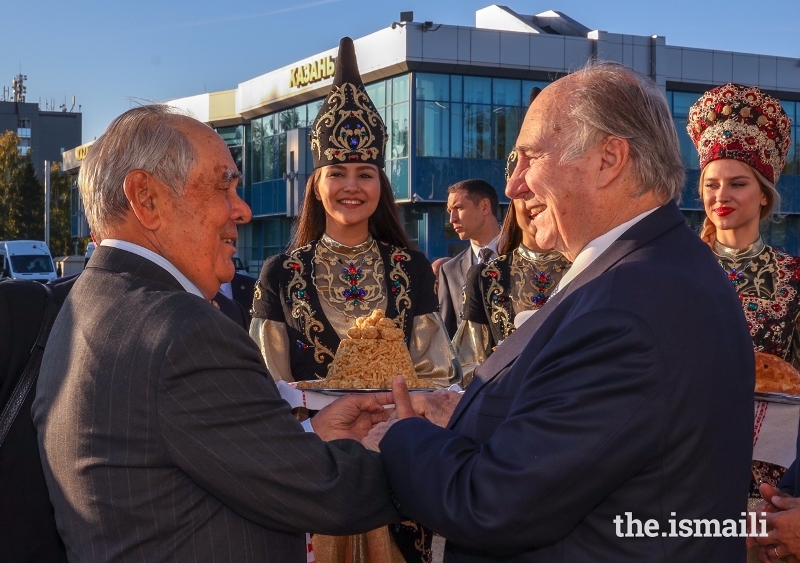
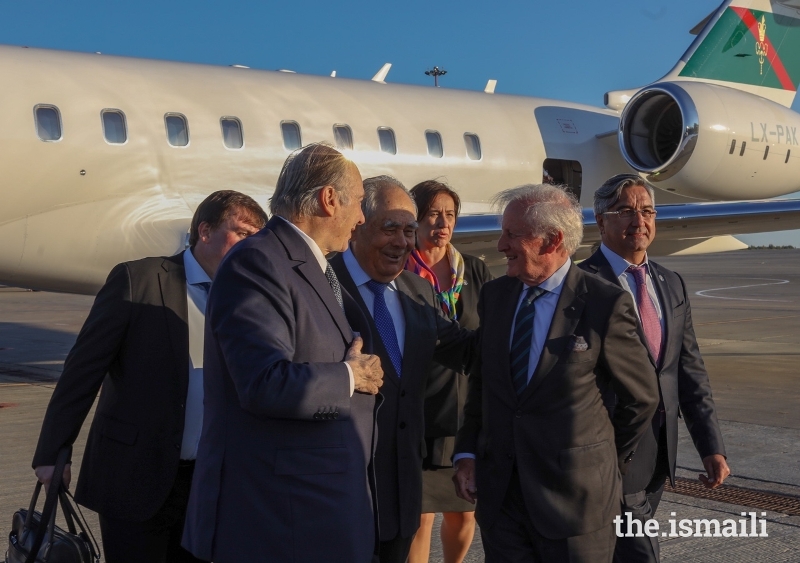
The Ismaili | 10 September 2019 | Global
Mawlana Hazar Imam arrives in Kazan
Earlier today, Mawlana Hazar Imam arrived in Kazan, Russia to preside over the 14th ceremony of the Aga Khan Award for Architecture. Hazar Imam was joined by Princess Zahra and her daughter Sara; Prince Hussain and his fiancée Ms Elizabeth Hoag; and Princess Salwa and Prince Irfan.
Upon arriving into Kazan International Airport, Hazar Imam and his family were welcomed by State Counsellor of Tatarstan Mintimer Shaimiev; Deputy Prime Minister of Tatarstan Shaikhraziev Vasil Gayazovich; and Minister of Culture of Tatarstan Irada Ayupova, along with leaders of the Aga Khan Development Network.
The Aga Khan Award for Architecture is presented every three years to projects that set new standards of excellence in architecture, planning practices, historic preservation and landscape architecture. Through its efforts, the Award seeks to identify and encourage building concepts that successfully address the needs and aspirations of societies across the world in which Muslims have a significant presence.
The 2019 Award Ceremony will be webcast at the.ismaili/live on Friday 13 September at 3:00 PM UTC+3. To stay informed of the latest news relating to the Aga Khan Award for Architecture, subscribe to Email updates, or follow The Ismaili on Facebook, Twitter, and Instagram.


Book
Aga Khan Award for Architecture 2019
Description
Aga Khan Award for Architecture 2019
The Aga Khan Award for Architecture is one of the most prestigious and renowned awards for architecture worldwide. Since 1980 the Award has been given every three years to projects that combine social and ecological aspects and translate them into innovative and exemplary design. The Award seeks to identify and encourage building concepts that successfully address the needs and aspirations of societies across the world, in which Muslims have a significant presence.
This publication presents the shortlist of the 2017–2019 award cycle. From a group of almost 400, 20 projects have been shortlisted by the Master Jury and evaluated by an expert group of technical reviewers. Some of these projects have been honoured with the Aga Khan Award. In addition to detailed descriptions of all projects, this book gathers a series of personal statements from the members of the Steering Committee and the Award’s Master Jury on key issues that were crucial in the discussions for the final selection and assignment of the award recipients. Assembled together, this book presents a selection of the outstanding examples of sustainable and socially relevant architecture in the world today and opens up fundamental perspectives for the planning of the future.
A Russian language edition of this publication is also available for pre-order.
https://architangle.com/book/aga-khan-a ... cture-2019
Aga Khan Award for Architecture 2019
Description
Aga Khan Award for Architecture 2019
The Aga Khan Award for Architecture is one of the most prestigious and renowned awards for architecture worldwide. Since 1980 the Award has been given every three years to projects that combine social and ecological aspects and translate them into innovative and exemplary design. The Award seeks to identify and encourage building concepts that successfully address the needs and aspirations of societies across the world, in which Muslims have a significant presence.
This publication presents the shortlist of the 2017–2019 award cycle. From a group of almost 400, 20 projects have been shortlisted by the Master Jury and evaluated by an expert group of technical reviewers. Some of these projects have been honoured with the Aga Khan Award. In addition to detailed descriptions of all projects, this book gathers a series of personal statements from the members of the Steering Committee and the Award’s Master Jury on key issues that were crucial in the discussions for the final selection and assignment of the award recipients. Assembled together, this book presents a selection of the outstanding examples of sustainable and socially relevant architecture in the world today and opens up fundamental perspectives for the planning of the future.
A Russian language edition of this publication is also available for pre-order.
https://architangle.com/book/aga-khan-a ... cture-2019
http://tatarstan.ru/eng/index.htm/news/1559257.htm
His Highness Prince Karim Aga Khan IV arrives in Kazan
11.09.2019
On September 11, at the Kazan International Airport, Tatarstan State Counsellor, UNESCO Special Envoy for Intercultural Dialogue Mintimer Shaimiev met His Highness Prince Karim Aga Khan IV, who arrived in Kazan.
Tatarstan Deputy Prime Minister Vasil Shaykhraziev, Minister of Culture of the republic Irada Ayupova, Deputy Chief of Staff of Tatarstan President’s Administration – Head of State Counsellor’s Secretariat Oleg Glebov and other officials took part in a brief welcoming ceremony.
His Highness Prince Karim Aga Khan IV arrived in Tatarstan to attend in the awarding ceremony of The 2019 Aga Khan Award for Architecture to be held in the Jalil Tatar Academic State Opera and Ballet Theatre on the 13th of September.
Tatarstan President's Press Office
His Highness Prince Karim Aga Khan IV arrives in Kazan
11.09.2019
On September 11, at the Kazan International Airport, Tatarstan State Counsellor, UNESCO Special Envoy for Intercultural Dialogue Mintimer Shaimiev met His Highness Prince Karim Aga Khan IV, who arrived in Kazan.
Tatarstan Deputy Prime Minister Vasil Shaykhraziev, Minister of Culture of the republic Irada Ayupova, Deputy Chief of Staff of Tatarstan President’s Administration – Head of State Counsellor’s Secretariat Oleg Glebov and other officials took part in a brief welcoming ceremony.
His Highness Prince Karim Aga Khan IV arrived in Tatarstan to attend in the awarding ceremony of The 2019 Aga Khan Award for Architecture to be held in the Jalil Tatar Academic State Opera and Ballet Theatre on the 13th of September.
Tatarstan President's Press Office
https://pamirdaily.com/
Prince Karim Aga Khan IV and Mintimer Shaimiev to Bolgar to issue a stamp in honor of the architectural award
September 12, 2019
Prince Karim Aga Khan IV and State Counselor of Tatarstan Mintimer Shaimiev took part in the ceremony of cancellation of a postage stamp issued in honor of the international Aga Khan Award for Architecture. The event was held at the Bulgarian Academy of Islam.
For entering the postage stamp with the logo of the award will be published, and a special envelope of the first day, as well as Moscow, Kazan and Bulgaria will be issued special cancellation stamp. Results will be released 150 thousand. Copies of the brand.
Shaimiev called the event significant for the "sacred Bulgarian land." He noted that the extinction of brands - a great opportunity to immortalize memorable events.
"I must say that we have learned how to approach these delicate matters revival of historical monuments. We are pleased that we managed to revive the facilities in full compliance with the very demanding regulations of UNESCO. And now we have a lot of experience, which we are ready to share "- State Councilor said.
Shaimiev thanked the Aga Khan for attention to Tatarstan. "For that reached these lands and showed the greatest respect for our people, believers and Russia", - he said to the prince.
It is important for people to keep the value of religion they profess, Prince Karim Aga Khan IV said. "It gives me great happiness to participate in this ceremony - special brand of extinction. It is of great importance in the preservation of the world ", - he stressed.
The delegation will examine the architectural gem of modern Bulgaria - complex "White Mosque". The complex consists of the residence of the spiritual leaders of Islam, madrassas for learning the basics of Islam and the building of the mosque. It opened in 2012.
In addition, the Prince take a tour of the architectural monuments of the Bulgarian fortress, the Museum of the Bulgarian civilization, the Museum of the Koran and the central part of the city.
Prince Karim Aga Khan is the spiritual leader of the Ismaili Muslims inherited this status at the age of 20 years. The Aga Khan provides spiritual guidance to the community of 15 million people who live in about 25 countries, mainly in West and Central Asia, Africa and the Middle East as well as in North America and Western Europe.
The Aga Khan is a direct descendant of the Prophet Muhammad through his cousin and son in law Ali, the first Imam, and his wife Fatima, the Prophet's daughter.
The awarding ceremony of the International Aga Khan Award for Architecture will take place on September 13 in the building of the Tatar Academic State Opera and Ballet Theater named after Musa Jalil. One of the six winners of the award was the project of Tatarstan - the development program of public spaces of the country.
The award serves as a means of supporting architectural concepts, successfully responding to the needs and the needs of communities in the countries in which a substantial proportion of the Muslim population.
---------------------
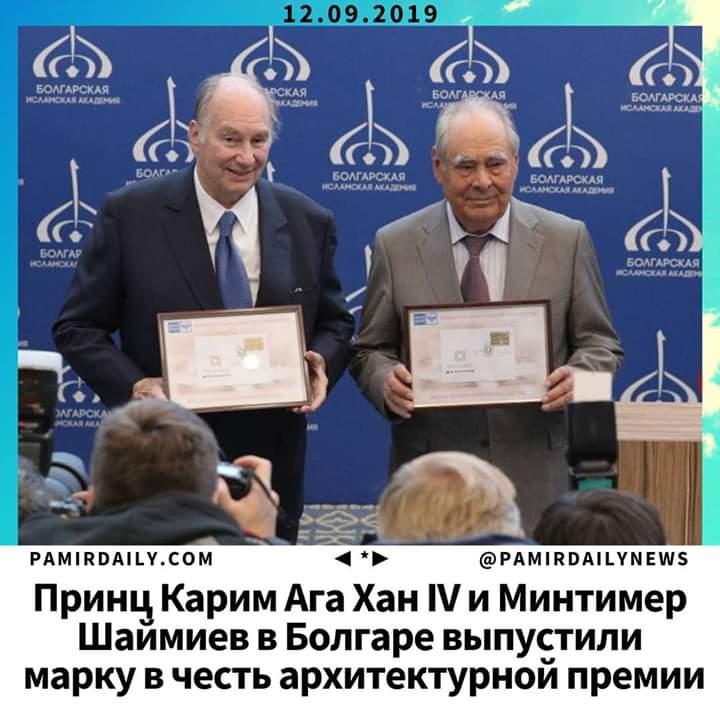
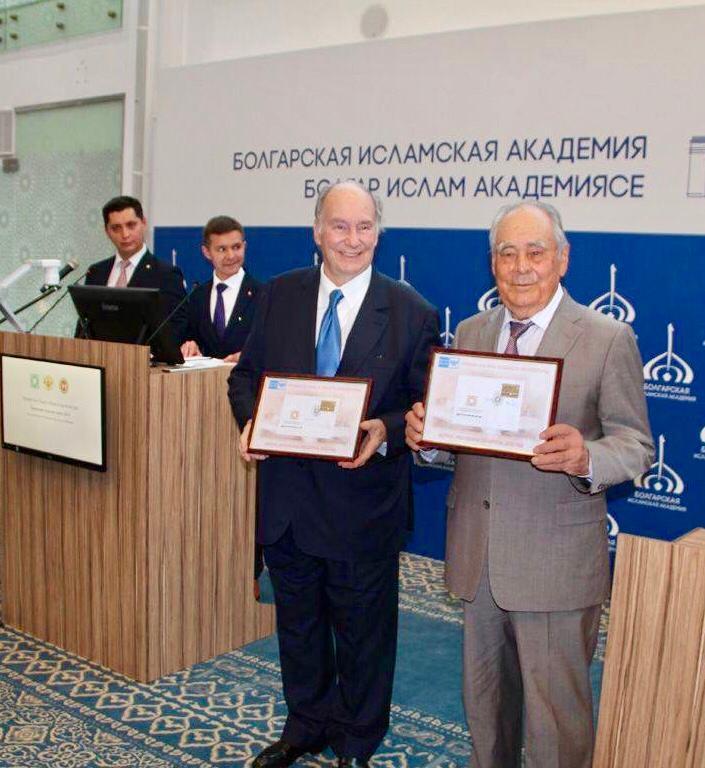
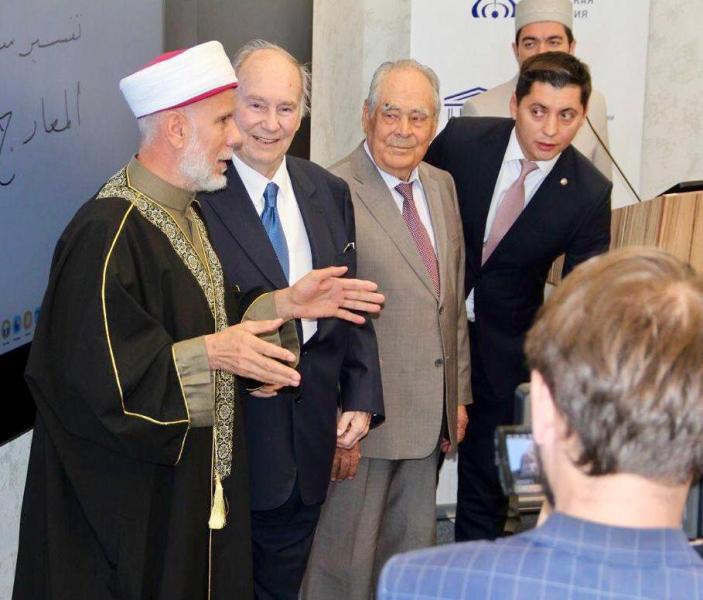
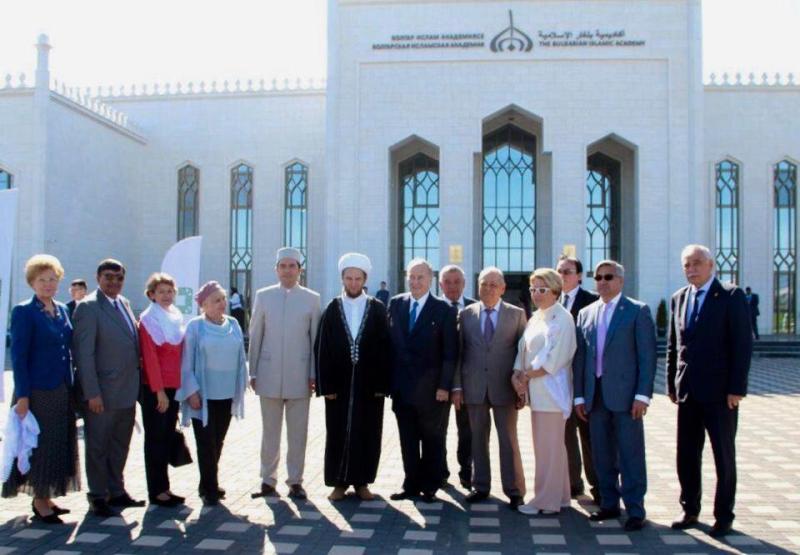
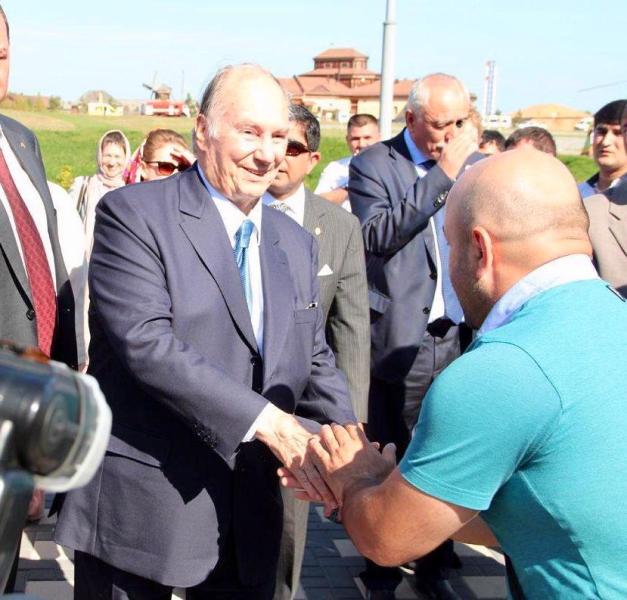
Prince Karim Aga Khan IV and Mintimer Shaimiev to Bolgar to issue a stamp in honor of the architectural award
September 12, 2019
Prince Karim Aga Khan IV and State Counselor of Tatarstan Mintimer Shaimiev took part in the ceremony of cancellation of a postage stamp issued in honor of the international Aga Khan Award for Architecture. The event was held at the Bulgarian Academy of Islam.
For entering the postage stamp with the logo of the award will be published, and a special envelope of the first day, as well as Moscow, Kazan and Bulgaria will be issued special cancellation stamp. Results will be released 150 thousand. Copies of the brand.
Shaimiev called the event significant for the "sacred Bulgarian land." He noted that the extinction of brands - a great opportunity to immortalize memorable events.
"I must say that we have learned how to approach these delicate matters revival of historical monuments. We are pleased that we managed to revive the facilities in full compliance with the very demanding regulations of UNESCO. And now we have a lot of experience, which we are ready to share "- State Councilor said.
Shaimiev thanked the Aga Khan for attention to Tatarstan. "For that reached these lands and showed the greatest respect for our people, believers and Russia", - he said to the prince.
It is important for people to keep the value of religion they profess, Prince Karim Aga Khan IV said. "It gives me great happiness to participate in this ceremony - special brand of extinction. It is of great importance in the preservation of the world ", - he stressed.
The delegation will examine the architectural gem of modern Bulgaria - complex "White Mosque". The complex consists of the residence of the spiritual leaders of Islam, madrassas for learning the basics of Islam and the building of the mosque. It opened in 2012.
In addition, the Prince take a tour of the architectural monuments of the Bulgarian fortress, the Museum of the Bulgarian civilization, the Museum of the Koran and the central part of the city.
Prince Karim Aga Khan is the spiritual leader of the Ismaili Muslims inherited this status at the age of 20 years. The Aga Khan provides spiritual guidance to the community of 15 million people who live in about 25 countries, mainly in West and Central Asia, Africa and the Middle East as well as in North America and Western Europe.
The Aga Khan is a direct descendant of the Prophet Muhammad through his cousin and son in law Ali, the first Imam, and his wife Fatima, the Prophet's daughter.
The awarding ceremony of the International Aga Khan Award for Architecture will take place on September 13 in the building of the Tatar Academic State Opera and Ballet Theater named after Musa Jalil. One of the six winners of the award was the project of Tatarstan - the development program of public spaces of the country.
The award serves as a means of supporting architectural concepts, successfully responding to the needs and the needs of communities in the countries in which a substantial proportion of the Muslim population.
---------------------





Last edited by Admin on Fri Sep 13, 2019 4:09 pm, edited 1 time in total.
Mawlana Hazar Imam visits historic city of Bolgar in Tatarstan
Earlier today, 12 September, Mawlana Hazar Imam arrived in Bolgar, located in southwestern Tatarstan, in Russia. During his visit, Hazar Imam spent time at a number of historic sites, and participated in a postage stamp cancellation ceremony to commemorate the 2019 Aga Khan Award for Architecture.
During his time in Bolgar, Hazar Imam participated in a postage stamp cancellation ceremony at the Bolgar Islamic Academy. Founded in 2016, the institute of higher education trains graduate students in a variety of fields relating to the study of theology and religion. Hazar Imam was accompanied at the ceremony by Mintimer Shaimiev, State Councellor of Tatarstan; and Daniyar Abdrakhmanov, Rector of the Bolgar Islamic Academy.
Following the ceremony, Mawlana Hazar Imam visited the White Mosque, one of the city’s focal points. The White Mosque contains minarets, a prayer room, and an arcade with 88 columns, while its main dome features exquisite stained glass windows.
Later in the day, Hazar Imam visited the Bulgarian Civilisation Museum — which exhibits a number of artefacts detailing the development of religion in the area of Tatarstan — and the adjacent Qur’an Museum, the site of one of the largest copies of the Qur’an in the world. Weighing half a ton and measuring over 2 metres tall, its cover is made of fabric with patterned decoration in silver and gold.
The history of Bolgar dates back to the 9th and 10th centuries; the city was once the political, economic, and cultural centre of the Volga Bolgar civilisation. Local residents adopted Islam in the year 922, thus establishing close ties with the Muslim world. The city enjoyed its heyday during the period of the Golden Horde in the 13th century, when it was an important trading centre. The entire historical and archeological complex at Bolgar has been designated as a UNESCO heritage site.
Photos at:
https://the.ismaili/news/mawlana-hazar- ... -tatarstan
Earlier today, 12 September, Mawlana Hazar Imam arrived in Bolgar, located in southwestern Tatarstan, in Russia. During his visit, Hazar Imam spent time at a number of historic sites, and participated in a postage stamp cancellation ceremony to commemorate the 2019 Aga Khan Award for Architecture.
During his time in Bolgar, Hazar Imam participated in a postage stamp cancellation ceremony at the Bolgar Islamic Academy. Founded in 2016, the institute of higher education trains graduate students in a variety of fields relating to the study of theology and religion. Hazar Imam was accompanied at the ceremony by Mintimer Shaimiev, State Councellor of Tatarstan; and Daniyar Abdrakhmanov, Rector of the Bolgar Islamic Academy.
Following the ceremony, Mawlana Hazar Imam visited the White Mosque, one of the city’s focal points. The White Mosque contains minarets, a prayer room, and an arcade with 88 columns, while its main dome features exquisite stained glass windows.
Later in the day, Hazar Imam visited the Bulgarian Civilisation Museum — which exhibits a number of artefacts detailing the development of religion in the area of Tatarstan — and the adjacent Qur’an Museum, the site of one of the largest copies of the Qur’an in the world. Weighing half a ton and measuring over 2 metres tall, its cover is made of fabric with patterned decoration in silver and gold.
The history of Bolgar dates back to the 9th and 10th centuries; the city was once the political, economic, and cultural centre of the Volga Bolgar civilisation. Local residents adopted Islam in the year 922, thus establishing close ties with the Muslim world. The city enjoyed its heyday during the period of the Golden Horde in the 13th century, when it was an important trading centre. The entire historical and archeological complex at Bolgar has been designated as a UNESCO heritage site.
Photos at:
https://the.ismaili/news/mawlana-hazar- ... -tatarstan
Bolgar, Russia, 12 September 2019 - Aga Khan Award for Architecture 2019. Postage Stamp Cancellation Ceremony. From videos and photos released by AKDn.
VIDEO STAMP CEREMONY:
https://youtu.be/3KlhITD-7T4
2019, September 13 in Kazan, Tatarstan, Russia
VIDEO NURANI FAMILY ARRIVING AT AKAA CEREMONY: (Nurani family arriving at AKAA: Prince Hussain, Princess Zahra, Princess Sarah, Princess Salwa.)
http://ismaili.net/timeline/2019/2019-0 ... family.mp4
2019, September 13 in Kazan, Tatarstan, Russia
SPEECH VIDEO
http://ismaili.net/timeline/2019/2019-0 ... speech.mp4
VIDEO STAMP CEREMONY:
https://youtu.be/3KlhITD-7T4
2019, September 13 in Kazan, Tatarstan, Russia
VIDEO NURANI FAMILY ARRIVING AT AKAA CEREMONY: (Nurani family arriving at AKAA: Prince Hussain, Princess Zahra, Princess Sarah, Princess Salwa.)
http://ismaili.net/timeline/2019/2019-0 ... family.mp4
2019, September 13 in Kazan, Tatarstan, Russia
SPEECH VIDEO
http://ismaili.net/timeline/2019/2019-0 ... speech.mp4
Aga Khan highlights architecture’s potential to inspire dialogue
Six projects receive 2019 Aga Khan Award for Architecture
Kazan, Republic of Tatarstan, Russia, 13 September 2019 – The six winning projects of the 2019 Aga Khan Award for Architecture (AKAA) were acclaimed earlier today at a ceremony held at Kazan’s Musa Jalil State Academic Opera and Ballet Theatre. Mintimer Shaimiev, State Counsellor of the Republic of Tatarstan, accompanied His Highness the Aga Khan, hereditary Imam (spiritual leader) of the Ismaili Muslims, in presiding over the Award Ceremony.
The six projects to share a US$ 1 million prize, as selected by the 2019 Award Master Jury are:
Revitalisation of Muharraq, Bahrain
Arcadia Education Project, South Kanarchor, Bangladesh
Palestinian Museum, Birzeit, Palestine
Public Spaces Development Programme, Republic of Tatarstan, Russian Federation
Alioune Diop University Teaching and Research Unit, Bambey, Senegal
Wasit Wetland Centre, Sharjah, United Arab Emirates
The six Award recipients, spanning three continents, include an urban heritage intervention, a floating school, a national museum, an ambitious programme to introduce public spaces across hundreds of localities, a university’s classrooms and halls, and an ecological centre.
“You are implementing the largest charitable, educational and humanitarian projects, support proactive, creative people, regardless of nationality or confession, said Mintimer Shaimiev in acknowledging the contribution of His Highness. “Your peacekeeping mission, your commitment to bringing civilisations closer and achieving unity in diversity are consonant with our goals, especially to me, as the UNESCO Special Envoy for Intercultural Dialogue.”
Speaking at the ceremony, His Highness the Aga Khan noted that on this visit to Tatarstan, he had seen “how committed people can honour the power both of cultural identity and cultural pluralism.”
“It is striking to see how churches and mosques, for example, have been built and preserved right next to one another as powerful symbols of a profound intercultural dialogue,” he said. These were examples, the Aga Khan explained, of what the world was in particular need of today, as we seek to meet accelerating environmental, social, technological, economic and political challenges.
The Award Ceremony was attended by Eleonora Valentinovna Mitrofanova, the Ambassador-at-large of the Ministry of Foreign Affairs, other government officials, ambassadors and members of the international diplomatic corps, and leading members of the architectural community from around the world.
Speaking about the theme of “Architecture in Dialogue”, which emerged from this 14th cycle of the Award, the Aga Khan explained the potential of the architectural world to inspire and enrich creative dialogues, embracing diverse and even divergent perspectives. “The rich architectural dialogue we seek to foster should include a renewed respect for the diversity of Islamic cultures themselves,” he said. It was also necessary, he added, to foster a dialogue with non-Islamic cultures including diverse religious traditions. “Architecture can lead the way in this effort – as we listen to one another and learn from one another across old divides.”
The Aga Khan went on to explain why the Ismaili Imamat was involved with architecture. “The simple answer lies in my conviction that architecture – more than any other art form – has a profound impact on the quality of human life,” he said. “I believe that we all have a responsibility to improve the quality of life whenever and wherever the opportunity arises. Our commitment to influencing the quality of architecture – intellectually and materially – grows directly out of our commitment to improving the quality of human life.”
Yesterday, the Aga Khan visited Bolgar, which was a Muslim religious centre as early as 922 and is renowned for its historic and archaeological significance. He toured the Bolgar Islamic Academy, where he attended a special stamp cancellation ceremony to commemorate the Aga Khan Award for Architecture ceremony in Kazan. Later in the day, he visited the White Mosque and the Bulgarian Civilisation Museum where he viewed one of the world’s largest Qurans. The historical and archaeological complex at Bolgar has been designated as a UNESCO heritage site.
https://www.akdn.org/press-release/aga- ... e-dialogue
*******
Gallery
The Aga Khan Award for Architecture 2019 Presentation Ceremony in Kazan
https://www.akdn.org/gallery/aga-khan-a ... mony-kazan
Six projects receive 2019 Aga Khan Award for Architecture
Kazan, Republic of Tatarstan, Russia, 13 September 2019 – The six winning projects of the 2019 Aga Khan Award for Architecture (AKAA) were acclaimed earlier today at a ceremony held at Kazan’s Musa Jalil State Academic Opera and Ballet Theatre. Mintimer Shaimiev, State Counsellor of the Republic of Tatarstan, accompanied His Highness the Aga Khan, hereditary Imam (spiritual leader) of the Ismaili Muslims, in presiding over the Award Ceremony.
The six projects to share a US$ 1 million prize, as selected by the 2019 Award Master Jury are:
Revitalisation of Muharraq, Bahrain
Arcadia Education Project, South Kanarchor, Bangladesh
Palestinian Museum, Birzeit, Palestine
Public Spaces Development Programme, Republic of Tatarstan, Russian Federation
Alioune Diop University Teaching and Research Unit, Bambey, Senegal
Wasit Wetland Centre, Sharjah, United Arab Emirates
The six Award recipients, spanning three continents, include an urban heritage intervention, a floating school, a national museum, an ambitious programme to introduce public spaces across hundreds of localities, a university’s classrooms and halls, and an ecological centre.
“You are implementing the largest charitable, educational and humanitarian projects, support proactive, creative people, regardless of nationality or confession, said Mintimer Shaimiev in acknowledging the contribution of His Highness. “Your peacekeeping mission, your commitment to bringing civilisations closer and achieving unity in diversity are consonant with our goals, especially to me, as the UNESCO Special Envoy for Intercultural Dialogue.”
Speaking at the ceremony, His Highness the Aga Khan noted that on this visit to Tatarstan, he had seen “how committed people can honour the power both of cultural identity and cultural pluralism.”
“It is striking to see how churches and mosques, for example, have been built and preserved right next to one another as powerful symbols of a profound intercultural dialogue,” he said. These were examples, the Aga Khan explained, of what the world was in particular need of today, as we seek to meet accelerating environmental, social, technological, economic and political challenges.
The Award Ceremony was attended by Eleonora Valentinovna Mitrofanova, the Ambassador-at-large of the Ministry of Foreign Affairs, other government officials, ambassadors and members of the international diplomatic corps, and leading members of the architectural community from around the world.
Speaking about the theme of “Architecture in Dialogue”, which emerged from this 14th cycle of the Award, the Aga Khan explained the potential of the architectural world to inspire and enrich creative dialogues, embracing diverse and even divergent perspectives. “The rich architectural dialogue we seek to foster should include a renewed respect for the diversity of Islamic cultures themselves,” he said. It was also necessary, he added, to foster a dialogue with non-Islamic cultures including diverse religious traditions. “Architecture can lead the way in this effort – as we listen to one another and learn from one another across old divides.”
The Aga Khan went on to explain why the Ismaili Imamat was involved with architecture. “The simple answer lies in my conviction that architecture – more than any other art form – has a profound impact on the quality of human life,” he said. “I believe that we all have a responsibility to improve the quality of life whenever and wherever the opportunity arises. Our commitment to influencing the quality of architecture – intellectually and materially – grows directly out of our commitment to improving the quality of human life.”
Yesterday, the Aga Khan visited Bolgar, which was a Muslim religious centre as early as 922 and is renowned for its historic and archaeological significance. He toured the Bolgar Islamic Academy, where he attended a special stamp cancellation ceremony to commemorate the Aga Khan Award for Architecture ceremony in Kazan. Later in the day, he visited the White Mosque and the Bulgarian Civilisation Museum where he viewed one of the world’s largest Qurans. The historical and archaeological complex at Bolgar has been designated as a UNESCO heritage site.
https://www.akdn.org/press-release/aga- ... e-dialogue
*******
Gallery
The Aga Khan Award for Architecture 2019 Presentation Ceremony in Kazan
https://www.akdn.org/gallery/aga-khan-a ... mony-kazan
